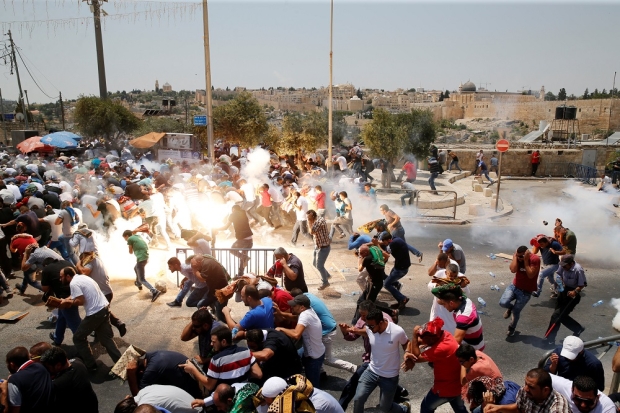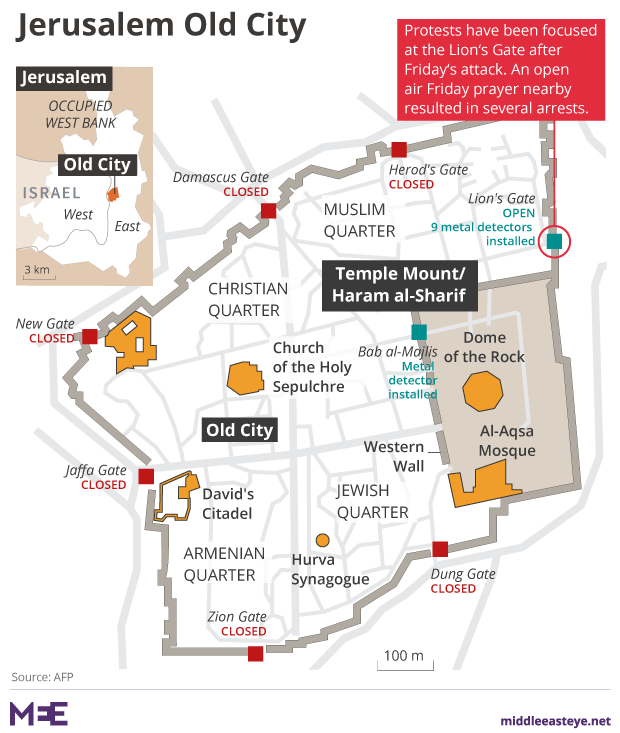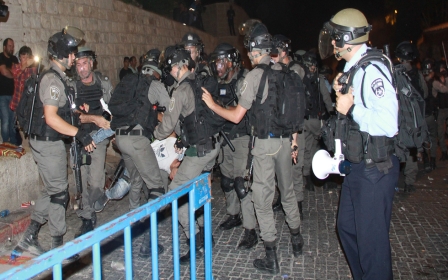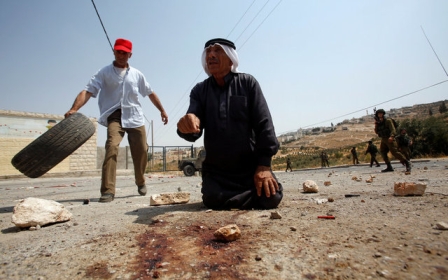Israel braces for Palestinian 'day of rage' as al-Aqsa talks collapse
JERUSALEM - Israel sent thousands of extra police into Jerusalem on Friday after talks to remove Israeli metal detectors from around the Noble Sanctuary compound failed, Palestinian officials were rounded up, and Palestinian religious leaders and politicians called for a "day of rage" and resistance.
Israel's cabinet on Friday morning said the security measures would remain around the site in Jerusalem's Old City, and thousands of extra police were being sent to the area, as Benjamin Netanyahu's government braced for mass protests over Israel's control of Islam's third holiest site, which includes al-Aqsa mosque.
The Israeli offer ... was unreservedly rejected by the Palestinians
- Hatem Abdel-Kader
Hatem Abdel-Kader, the Palestinian Authority's chief negotiator, was among a number of officials arrested by Israel early on Friday morning, hours after he told Middle East Eye that talks to resolve the crisis had failed.
"The Israeli offer to keep the metal detectors in place, but only require suspicious individuals to pass through them, was unreservedly rejected by the Palestinians," he said.
Abdel-Kader warned that if the situation persists, "there will be an escalation tomorrow. Clashes will inevitably continue, until freedom of religion is restored."
Israel has not given its reasons for his arrest.
'Act now to protect al-Aqsa'
Clashes between Palestinians hurling stones and Israeli police using stun grenades have been a daily occurrence in East Jerusalem since metal detectors were placed on Saturday at entrances to the Noble Sanctuary, which includes the al-Aqsa mosque.
Israel installed the metal detectors after three Arab-Israeli gunmen shot dead two Israeli policemen on 14 July outside the Noble Sanctuary complex in one of the most serious attacks in the area in years. Israeli security forces killed the assailants.
Religious figures and Palestinian politicians called for resistance on Friday morning to what is widely seen across Palestine as an attempt by Israel to control al-Aqsa.
Abdala Athem Salhab, the head of the Waqf counsel which administers the Noble Sanctury site, said: "We are all united and it's our responsibility to protect the Aqsa mosque - we won't step back. We are asking Jordan to intervene to remove the doors, otherwise Israel is leading the area to religious war."
Ahmed Tibi, a member of the Israeli parliament for the Arab List coalition, said it was the duty of Palestinians in Israel and Jerusalem and the West Bank "to act now in order to protect the Aqsa from the Israeli forces. The Aqsa is not only a religion issue but also a political one".
"Our response to Netanyahu is that we say no to the detectors and we will continue the protest. We hope the Islamic world and the international community take action to stop the violations."
Violations
Muslim religious authorities claim the metal detectors violate a delicate agreement on worship and security arrangements at the Jerusalem site and have urged Palestinians not to pass through. Prayers have been held near an entrance to the complex.
On Thursday night, Israeli forces wounded 22 Palestinians at Lion's Gate, near Haram al-Sharif, in Jerusalem. According to the Red Crescent, two of those hurt are in serious condition after they were hit by a stun grenade.
Israel's prime minister, Benjamin Netanyahu, has considered removing the devices at the Jerusalem holy site but so far, the detectors remain in place.
Abdel-Kader said that the move to install metal detectors in the compound is a power play on Israel’s part.
“The metal detectors serve no security purpose whatsoever. Rather, their erection is a political play to pressure Palestinians into relinquishing control of al-Aqsa,” he told Middle East Eye.
The metal detectors serve no security purpose whatsoever
- Hatem Abdel-Kader, chief PA negotiator
“With the religious and political sensitivities surrounding al Aqsa - as a universal sanctuary for Palestinians, Arabs and Muslims - Israel is taking a massive gamble and ultimately, crossing a red line. Undoubtedly, this may have dangerous consequences,” Abdel-Kader said.
The negotiator added that all of the mosques in Jerusalem will be closed on Friday in an effort to “direct Palestinians toward al-Aqsa”, which he hopes will draw thousands of people.
Far-right members of Netanyahu's government have publicly urged him to keep the devices in place at the flashpoint. Still, Israeli media reports said security chiefs were divided over the issue amid concerns about wider Palestinian unrest in East Jerusalem and the West Bank.
Turkish President Recep Tayyip Erdogan urged his Israeli counterpart Reuven Rivlin to swiftly remove the detectors "within the framework of freedom of religion and worship".
"Given the importance that Haram al-Sharif carries for the whole Islamic world, the metal detectors put in place by Israel should be removed in the shortest possible time and an end put to the tension," Erdogan said.
Rivlin told Erdogan that "the steps taken on the Temple Mount were intended to ensure that such acts of terror could not be repeated," according to the Israeli presidency.
On Thursday, the US expressed concern over a possible escalation if Israel kept its metal detectors and doors in place.
The White House called on Israel and Jordan to act in order to find a suitable solution to keep the status quo.
It said in a statement: "The United States is very concerned about tensions surrounding the Temple Mount/Haram al-Sharif, a site holy to Jews, Muslims and Christians.
"[It] calls upon Israel and Jordan to make a good faith effort to reduce tensions and to find a solution that assures public safety and the security of the site and maintains the status quo."
As negotiations stall, Abdel-Kader warned of a new intifada if the situation escalates further.
“The Israelis are well aware and know that past intifadas were inflamed by security measures relating to the mosque. Netanyahu must personally take responsibility for the crisis,” he said.
This article is available in French on Middle East Eye French edition.
New MEE newsletter: Jerusalem Dispatch
Sign up to get the latest insights and analysis on Israel-Palestine, alongside Turkey Unpacked and other MEE newsletters
Middle East Eye delivers independent and unrivalled coverage and analysis of the Middle East, North Africa and beyond. To learn more about republishing this content and the associated fees, please fill out this form. More about MEE can be found here.






